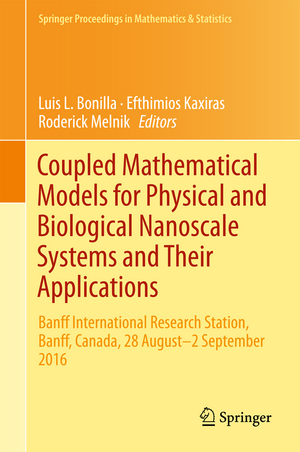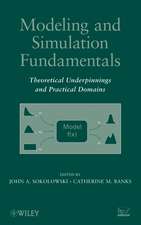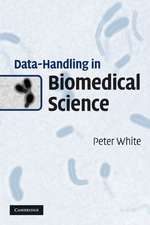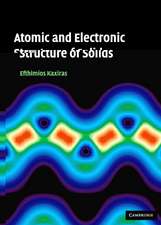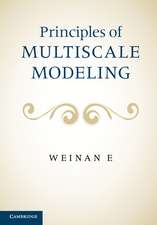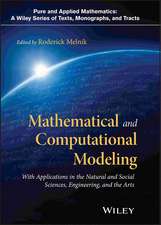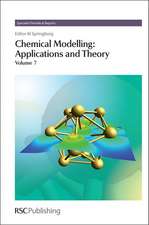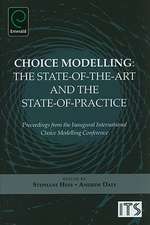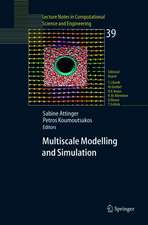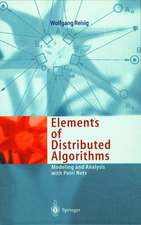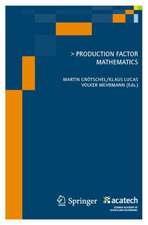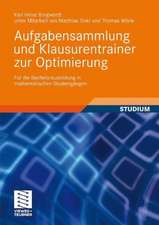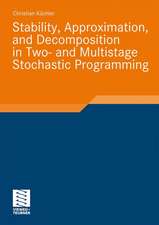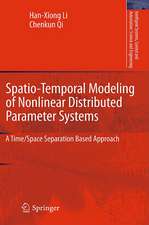Coupled Mathematical Models for Physical and Biological Nanoscale Systems and Their Applications: Banff International Research Station, Banff, Canada, 28 August - 2 September 2016: Springer Proceedings in Mathematics & Statistics, cartea 232
Editat de Luis L. Bonilla, Efthimios Kaxiras, Roderick Melniken Limba Engleză Hardback – 22 iun 2018
Due to the vastness, novelty and complexity of the interfaces between mathematical modeling and nanoscience and nanotechnology, many important areas in these disciplines remain largely unexplored. In their efforts to move forward, multidisciplinary research communities have come to a clear understanding that, along with experimental techniques, mathematical modeling and analysis have become crucial to the study, development and application of systems at the nanoscale.
The conference, held at BIRS in autumn 2016, brought together experts from three different communities working in fields where coupled mathematical models for nanoscale and biosystems are especially relevant: mathematicians, physicists (both theorists and experimentalists), and computational scientists, including those dealing with biological nanostructures. Its objectives: summarize the state-of-the-art; identify and prioritize critical problems of major importance that require solutions; analyze existing methodologies; and explore promising approaches to addressing the challenges identified.
The contributions offer up-to-date introductions to a range of topics in nano and biosystems, identify important challenges, assess current methodologies and explore promising approaches. As such, this book will benefit researchers in applied mathematics, as well as physicists and biologists interested in coupled mathematical models and their analysis for physical and biological nanoscale systems that concern applications in biotechnology and medicine, quantum information processing and optoelectronics.
| Toate formatele și edițiile | Preț | Express |
|---|---|---|
| Paperback (1) | 562.40 lei 38-44 zile | |
| Springer International Publishing – 15 dec 2018 | 562.40 lei 38-44 zile | |
| Hardback (1) | 648.05 lei 6-8 săpt. | |
| Springer International Publishing – 22 iun 2018 | 648.05 lei 6-8 săpt. |
Din seria Springer Proceedings in Mathematics & Statistics
- 15%
 Preț: 642.03 lei
Preț: 642.03 lei - 15%
 Preț: 646.62 lei
Preț: 646.62 lei - 18%
 Preț: 727.31 lei
Preț: 727.31 lei - 24%
 Preț: 1236.82 lei
Preț: 1236.82 lei - 18%
 Preț: 727.97 lei
Preț: 727.97 lei - 18%
 Preț: 1016.01 lei
Preț: 1016.01 lei - 15%
 Preț: 656.43 lei
Preț: 656.43 lei - 18%
 Preț: 947.35 lei
Preț: 947.35 lei - 15%
 Preț: 646.62 lei
Preț: 646.62 lei - 18%
 Preț: 948.92 lei
Preț: 948.92 lei - 18%
 Preț: 1699.47 lei
Preț: 1699.47 lei - 18%
 Preț: 1120.18 lei
Preț: 1120.18 lei - 15%
 Preț: 644.95 lei
Preț: 644.95 lei - 18%
 Preț: 1233.83 lei
Preț: 1233.83 lei - 18%
 Preț: 1120.18 lei
Preț: 1120.18 lei - 18%
 Preț: 1033.37 lei
Preț: 1033.37 lei - 18%
 Preț: 948.92 lei
Preț: 948.92 lei - 18%
 Preț: 896.08 lei
Preț: 896.08 lei - 18%
 Preț: 1115.46 lei
Preț: 1115.46 lei - 18%
 Preț: 952.09 lei
Preț: 952.09 lei - 18%
 Preț: 1230.66 lei
Preț: 1230.66 lei - 15%
 Preț: 647.59 lei
Preț: 647.59 lei - 18%
 Preț: 1124.92 lei
Preț: 1124.92 lei - 20%
 Preț: 1630.95 lei
Preț: 1630.95 lei - 18%
 Preț: 1123.35 lei
Preț: 1123.35 lei - 18%
 Preț: 950.52 lei
Preț: 950.52 lei - 18%
 Preț: 947.35 lei
Preț: 947.35 lei - 18%
 Preț: 1003.70 lei
Preț: 1003.70 lei - 18%
 Preț: 956.81 lei
Preț: 956.81 lei - 18%
 Preț: 889.75 lei
Preț: 889.75 lei - 18%
 Preț: 1000.24 lei
Preț: 1000.24 lei - 18%
 Preț: 1122.56 lei
Preț: 1122.56 lei - 18%
 Preț: 1005.74 lei
Preț: 1005.74 lei - 18%
 Preț: 950.96 lei
Preț: 950.96 lei - 18%
 Preț: 1009.08 lei
Preț: 1009.08 lei - 18%
 Preț: 1008.91 lei
Preț: 1008.91 lei - 18%
 Preț: 947.35 lei
Preț: 947.35 lei - 18%
 Preț: 1113.89 lei
Preț: 1113.89 lei - 18%
 Preț: 1113.71 lei
Preț: 1113.71 lei - 18%
 Preț: 1400.35 lei
Preț: 1400.35 lei - 18%
 Preț: 969.44 lei
Preț: 969.44 lei - 18%
 Preț: 1401.93 lei
Preț: 1401.93 lei - 18%
 Preț: 948.92 lei
Preț: 948.92 lei - 18%
 Preț: 1392.46 lei
Preț: 1392.46 lei - 20%
 Preț: 878.66 lei
Preț: 878.66 lei - 20%
 Preț: 1002.90 lei
Preț: 1002.90 lei - 18%
 Preț: 1120.99 lei
Preț: 1120.99 lei - 18%
 Preț: 942.63 lei
Preț: 942.63 lei - 18%
 Preț: 1113.09 lei
Preț: 1113.09 lei
Preț: 648.05 lei
Preț vechi: 762.42 lei
-15% Nou
Puncte Express: 972
Preț estimativ în valută:
124.02€ • 127.01$ • 103.16£
124.02€ • 127.01$ • 103.16£
Carte tipărită la comandă
Livrare economică 19 martie-02 aprilie
Preluare comenzi: 021 569.72.76
Specificații
ISBN-13: 9783319765983
ISBN-10: 3319765981
Pagini: 310
Ilustrații: X, 314 p. 100 illus., 68 illus. in color.
Dimensiuni: 155 x 235 mm
Greutate: 0.63 kg
Ediția:1st ed. 2018
Editura: Springer International Publishing
Colecția Springer
Seria Springer Proceedings in Mathematics & Statistics
Locul publicării:Cham, Switzerland
ISBN-10: 3319765981
Pagini: 310
Ilustrații: X, 314 p. 100 illus., 68 illus. in color.
Dimensiuni: 155 x 235 mm
Greutate: 0.63 kg
Ediția:1st ed. 2018
Editura: Springer International Publishing
Colecția Springer
Seria Springer Proceedings in Mathematics & Statistics
Locul publicării:Cham, Switzerland
Cuprins
Preface.- Part A. Charge and Spin Transport in Low-Dimensional Structures: Nonlinear Quantum Mechanics: Björn Birnir.- Chaotic Current Self-Oscillations in Doped, Weakly Coupled Semiconductor Superlattices for True Random Number Generation: Yaohui Zhang et al.- Transport out of Locally Broken Detailed Balance: Rafael Sánchez.- Non-Perturbative Approaches in Nanoscience and Corrections to Finite-Size Scaling: J. Kaupuzs et a.- Continuum Model for Coupled Acousto-Optical Phonons in Piezoelectric Materials: Morten Willatzen et al.- Part B. Modeling Biological Phenomena from Nano to Macro Scales: Stochastic Models of Tumor Induced Angiogenesis: L.L. Bonilla et al.- Biofilm Mechanics and Patterns: A. Carpio et al.- Modelling the Unfolding Pathway of Biomolecules: Theoretical Approach and Experimental Prospect: Carlos A. Plata et al.- The Geometry of Most Probable Trajectories in Noise-Driven Dynamical Systems: John C. Neu et al.- Part C. Mathematics for 2D Materials and Properties of Confined Nanostructures: Classical Density-Functional Theory Studies of Fluid Adsorption on Nanopatterned Planar Surfaces: Peter Yatsyshin et al.- Modeling Metastability in CdTe Solar Cells Due to Cu Migration: Da Guo et al.- A Multiscale Molecular Dynamics and Coupling with Nonlinear Finite Element Method: S. Urata et al.- Modeling Electronic Properties of Twisted 2D Atomic Heterostructures: Stephen Carr et al.- Molecular Dynamics and Related Computational Methods with Applications to Drug Discovery: Jordane Preto et al.- Macroscopic Models for the Bioelectronic Interface of Engineered Artificial Membranes: William Hoiles et al.
Textul de pe ultima copertă
This volume gathers selected contributions from the participants of the Banff International Research Station (BIRS) workshop Coupled Mathematical Models for Physical and Biological Nanoscale Systems and their Applications, who explore various aspects of the analysis, modeling and applications of nanoscale systems, with a particular focus on low dimensional nanostructures and coupled mathematical models for their description.
Due to the vastness, novelty and complexity of the interfaces between mathematical modeling and nanoscience and nanotechnology, many important areas in these disciplines remain largely unexplored. In their efforts to move forward, multidisciplinary research communities have come to a clear understanding that, along with experimental techniques, mathematical modeling and analysis have become crucial to the study, development and application of systems at the nanoscale.
The conference, held at BIRS in autumn 2016, brought together experts from three different communities working in fields where coupled mathematical models for nanoscale and biosystems are especially relevant: mathematicians, physicists (both theorists and experimentalists), and computational scientists, including those dealing with biological nanostructures. Its objectives: summarize the state-of-the-art; identify and prioritize critical problems of major importance that require solutions; analyze existing methodologies; and explore promising approaches to addressing the challenges identified.
The contributions offer up-to-date introductions to a range of topics in nano and biosystems, identify important challenges, assess current methodologies and explore promising approaches. As such, this book will benefit researchers in applied mathematics, as well as physicists and biologists interested in coupled mathematical models and their analysis for physical and biological nanoscale systems that concern applications in biotechnology and medicine, quantum information processing and optoelectronics.
Due to the vastness, novelty and complexity of the interfaces between mathematical modeling and nanoscience and nanotechnology, many important areas in these disciplines remain largely unexplored. In their efforts to move forward, multidisciplinary research communities have come to a clear understanding that, along with experimental techniques, mathematical modeling and analysis have become crucial to the study, development and application of systems at the nanoscale.
The conference, held at BIRS in autumn 2016, brought together experts from three different communities working in fields where coupled mathematical models for nanoscale and biosystems are especially relevant: mathematicians, physicists (both theorists and experimentalists), and computational scientists, including those dealing with biological nanostructures. Its objectives: summarize the state-of-the-art; identify and prioritize critical problems of major importance that require solutions; analyze existing methodologies; and explore promising approaches to addressing the challenges identified.
The contributions offer up-to-date introductions to a range of topics in nano and biosystems, identify important challenges, assess current methodologies and explore promising approaches. As such, this book will benefit researchers in applied mathematics, as well as physicists and biologists interested in coupled mathematical models and their analysis for physical and biological nanoscale systems that concern applications in biotechnology and medicine, quantum information processing and optoelectronics.
